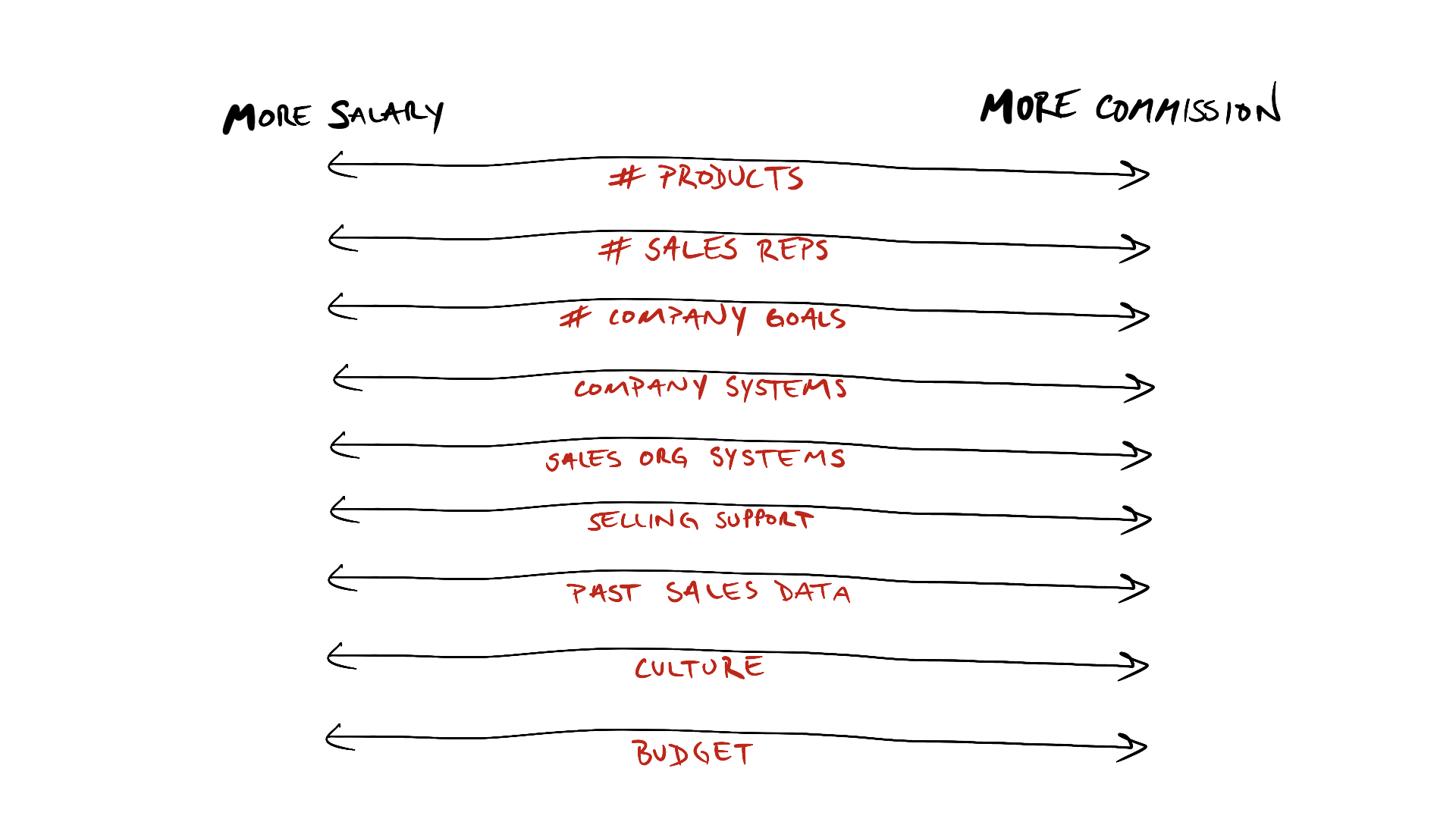When I walk into my local ice cream shop, I'm very unimpressed with most of the flavors. Same for the freezer aisle at the grocery store. And by unimpressed, I'm really saying most ice cream is yuck.
When it comes to sales compensation plans, they're a lot like most ice cream: yuck. Some are so bad that I still have a lingering aftertaste years later.
How about the time my sales team led the company in discounting existing products at contract renewal only to “sell” them another product that netted the company $0, but got them paid the full commission for “selling” the new product? Yuck, that’s a bad sales compensation plan.
Or the time we paid average reps more commissions than our best reps due to monthly accelerators – overpaying reps for beating quota in a single month. Top performers were consistently over quota, but average reps would miss for a month or two and then kill it in one month and get paid as much or more from the accelerators as the best performers got paid for consistent, quality performance. Yuck, that’s a bad sales compensation plan.
Or when sales reps would ask customers to buy our cheapest product for a few dollars a month and then quickly upgrade them to the full product and in the process cut out a partner and not have to give up 20% of their commission. Yuck, that’s a bad sales compensation plan.
I’ve had to stomach lots of sales compensation plans. My first gig was 100% commission “eat what you kill.” The next gig was selling a product to a customer that didn’t exist, or at least never wanted our product. I’ve sold the best product in the market twice: once I hated it, once I loved it. I spent a decade at HubSpot and helped the company grow for $15M to $1B in sales. My last job was Country Manager for Australia and New Zealand and saw the impacts of sales compensation plans on not just the sales team, but every other customer facing team.
Every year, there was a new flavor of sales commission plan. Sometimes more than once a year. So when founders ask me how to pay their first sales hire, I have a lot to say – as I do about ice cream flavors. You would, quite naturally, expect that I explain to them all the intricacies of what to do, what to avoid, and the millions of loopholes and mistakes to avoid (with sales plans), right?
Nope.
Instead, as I eat my favorite ice cream, I say, “Just pay them 100% salary,” and then watch the founders get very confused and nervous as they imagine overpaying a non-performing sales rep.
“Show me the incentive and I will show you the outcome.” - Charlie Munger
The Argument for Commissions
There are two core arguments for paying sales people commission:
- Sales is hard, tedious, and soul crushing
- To align sales rep behavior with company goals
Because sales is hard, no wonder organizations have been devising ways commission based sales compensation plans to help sales reps do the hard yards.
But once you have created a sales compensation plan that involves commissions, you have created a problem for yourself. You now have to figure out a way to align the seller’s personal interest with the company's many goals. This is why we get complicated sales plans. It’s a necessary control gauge for the commission plan problem created because sales is hard.
You might think there is a perfect sales plan that you can copy and paste into your organization, but no two companies are the same. There are a number of factors that weigh into what will be most effective for your company. These factors are broadly categorized as company maturity and sales rep culture. Imagine each factor as a spectrum. Depending on where your organization is on the spectrum for each factor, you would be wise to choose a highly complicated or very simple commission plan.
A general rule is:
As each of these factors grows in size and/or complexity, commission plans are more useful, but never perfect, at producing desired outcomes.
Large teams and complicated environments make cause and effect more difficult to tease out. This is a challenge for a company of any size, but with startups the problem is worse: almost all of the systems needed to implement a commission plan are non-existent. There is also next to no data and the company’s goals and strategies change too rapidly. In other words, startups are stuck in a chicken and egg scenario where the company needs a sales rep to sell, but they’re woefully unprepared to hire a sales rep.
The Ice Cream Sales Plan
Hiring your first sales rep is a difficult rite of passage for any startup. Transitioning from founder led sales to building a sales team is hard. There are many unanswerable questions:
- Do we have enough leads?
- Do we have a sales process that works?
- Do we hire a junior sales rep, an Account Executive, a Sales Manager, or a VP of Sales?
- How do we onboard them?
- Do we have the surrounding systems to support a seller?
On top of all that you have to consider how to pay them.
In the simplest terms, the sales compensation plan must improve your chances of:
- Winning business from new customers
- Getting paid in a timely manner
- Retaining customers for the long haul
Every company will have other goals as well, but I urge you to let them go for now, at least in terms of creating a sales compensation plan. You’ll just make things yucky.
Let’s use an analogy.
I grew up not far from the Ben & Jerry’s ice cream factory. They’re famous for crazy ice cream flavors. Here’s the description from the tub of my favorite flavor, The Tonight Dough.
“Caramel & Chocolate Ice Cream with Chocolate Cookie Swirls & Chunks of Chocolate Chip Cookie Dough & Peanut Butter Cookie Dough.”
One of the cool things about going to the factory is that they have lots of weird flavors of ice cream mixed with all sorts of extra ingredients. Most of them never make it to market because they’re terrible. Much worse than the freezer aisle.
If you magically were put in charge of the factory for a day, what product would you make if you wanted lots of sales at the ice cream counter? A complicated one? Only if you want Day 1 to be your last day.
If your goal is more sales, I’d wager you’d go with something on the simpler side of things. Perhaps something like the Neapolitan tub of ice cream. Instead of making something super simple, you put vanilla, chocolate, and…
Wait for it…
Wait…
STRAWBERRY ICE CREAM!
All in one tub! You’re not just visionary, you’re adventurous and pragmatic. You’d get a promotion after Day 1 for sure.
So let’s design your perfect Ice Cream Sales Plan.
- 100% salary. Sure, there are downsides to 100% salary, but there are ways to make up for no commission.
- Company Target = Seller’s Quota. Make the first sales rep’s quota the company sales target. They will get credit for every dollar that comes in, whether they touch it or not, but the quota gets made public and is regularly shared with the entire team. Public targets are very motivating and this setup also helps the sales rep have an owner’s mindset and balances out short term and long term goals.
- Bonuses are similar to a commission but easier to implement and you can pay for good results when you have more data. The bonus should be tied to new customer revenue, getting paid in a timely manner, and smooth customer onboarding – the best indicator of long term customer retention. My experience is that sales reps setting quality expectations is the single best way to retain customers for the long haul.
- Equity is a powerful force to align the seller and the company’s interest. It helps sellers move closer to having an owner’s mindset, solving for the customer, and putting the company’s interest above their own.
- Early termination options help you course correct if you’ve made a mistake. Sometimes sales reps fail and it’s not their fault. They could be the wrong type of sales person for your organization, you could have misinterpreted customers’ desire for your product, you could have hired too soon, etc. If you’re going to take all the risk and pay the rep 100% salary, this is a good counter balance to that risk that protects you.
The combination of public quotas, bonuses tied to key metrics, equity, and early termination options is plenty of incentive to compensate for no commission in your sales compensation plan.
Getting a handle on the financial risk
I can hear the chorus of founders objecting, “But what if we pay a lousy rep too much money? Sales reps are so expensive.” But so is Ben & Jerry’s The Tonight Dough. It’s true, sales people are expensive, and it would suck to pay a bad seller lots of money, but let’s quantify the risk and calculate the downside. (Also, a bad rep is a bad rep. No compensation plan can turn a bad rep into a good one. Trust me.)
This means that we are risking $25,000 by paying the sales rep 100% salary.
Now, you might be wondering why I chose 50% attainment. Because if the rep achieves less than 50%, then you either hired very poorly and any comp plan would have been worthless, or you hired too early and there are lots of internal blockers that are impacting the sales rep’s ability to sell.
A good rep could easily do 50% of their target for lots of very valid reasons and you should still keep them on.
So the question becomes, is $25,000 of potential overpayment worth it?
Here are just some of the benefits from going 100% salary with The Ice Cream Sales Plan:
- Better Alignment between seller’s goals and company’s goals
- Simple to create, implement, and track
- Seller will have an owner’s/founder’s mindset
- Known expenditure
- Bonuses paid when you have more information
- Build the ship while you sail it, create systems as you grow
Do you stick with no commission forever?
I’m a big fan of commission based sales plans. I’m just not a fan of them when hiring your first sales rep. Commission based sales plans get very complicated, very quickly and they require solid modeling and historical sales data. Most startups don’t have the systems and data to build a good commission based plan.
The key is to review your sales plan annually and create a compensation plan that best aligns sales reps with the company goals.
Are you having trouble retaining customers and is it a problem with expectations set in the sales process? There is a sales plan for that.
Do you want to incent your very best sales reps to sell even more? There is a sales plan for that.
Launching a new product? There is a sales plan for that.
But in order for any sales plan to be effective it needs to be informed by past sales data. And most startups hiring their first sales rep don’t have this data. In the meantime, set expectations with your new hire that you’ll review the sales compensation plan regularly to make sure everybody wins. Everybody likes ice cream.

